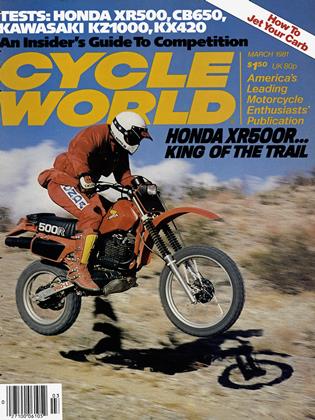The Champ Who Didn't Repeat...Yet
Bernie Schreiber Lived Up To His Own Prediction By Winning The World Trials Title In 1979. In 1980, He Won Most Of The Battles And Lost The War.
Len Weed
During the 1970 Trans-AMA Joel Robert won six of the eight races—and finished seventh overall in the series. Bernie Schreiber, America's first world trials champion, can appreciate how the Belgian bermbuster must have felt. All the defending world trials champion did in 1980 was set a new record for most victories in a season, winning six of the last nine events on the calendar. And in two of the three misses, he was plagued by mechanical problems.
His performance, however, wasn't quite enough. Ulf Karlson of Sweden, winner of just one of the dozen world trials, was more consistent if less spectacular. He accumulated 10 more points for the year and became champion for 1981.
Still, Schreiber's mad sprint at the finish would have proved successful if Karlson had been just two minutes slower finishing in Switzerland. A time disqualification there would have cost the Swede 12 points. But, 10 points or 2 min., Bernie had to settle for second best.
Schreiber, 21, began the year hoping to give Bultaco its eighth straight world (or European) trials championship. By season's end he had severed his 10-year association with the strike-crippled factory and was riding for a minicycle manufacturer that had never sold an adult trials bike.
Ironically Schreiber's first contact with the Italian Italjet factory came about because he was looking for a fresh Bultaco to ride after competing in the Scottish Six Days Trial. Bernie led the Highland classic for the first three days, before dropping to a sixth place finish. Bernie, who had moved his base from England to Italy, called the Italian Bultaco importer. Instead of a Sherpa, im-
porter Leo Tartarini, offered him a contract with Italjet. At that time Schreiber was unaware that Tartarini also owned the Italjet factory.
Italjet wanted to get into trials because their homeland had gone stark raving bonkers about keeping their feet up; Italians were buying more trials bikes than the English, the inventors of the sport. SWM and Fantic were already in the international market. Italjet had an engine, a frame that was more or less a Bultaco replica, and an intense desire to build the world's best trials bike.
Schreiber mulled the offer, aware of the problems of switching from a proven bike to an untested prototype in the middle of a title defense bogged by his usual slow start. The (since-resolved) strike situation at Bultaco was in its fifth month at that time. Manuel Soler, grandnephew of Bultaco founder F. X. Bulto, had already agreed to ride and do development work for Italjet. Schreiber finally decided to make the switch. He felt that he and Soler, working together, could build a winner. The pair left for France where they finished one-two on their final Bultaco rides.
Suddenly Soler decided to return to Spain to accept an offer from Montesa. That left Schreiber, relatively inexperienced in development, with the burden of getting a bike ready for the next world round. He had three weeks.
Twelve-hour work days followed. Schreiber compared the continually modified prototype against a Bultaco. Finally, he had a bike he felt was getting better traction than the Bultaco, but it was far from finished. He left for Switzerland wondering what would happen.
What happened wasn't exactly confidence inspiring. Bernie lost the top three gears in his transmission. That slowed him so much he timed out. A week later ignition problems cost him over two hours of down time. He raced around the course without walking the sections and just barely finished on time, out of the points.
Then he suffered a third jolt in England a couple of days later. Arriving for the nationally televised Kickstart Trial, Schreiber wrecked his bike in a crash seconds after entering the practice area.
At this point, with four world rounds remaining, he was in fourth place, 31 points behind Karlson.
An international two-day trial the weekend before the Italian world trial became the pivot point of the development program. After finishing a discouraging fifth on Saturday, Bernie had the factory lop a significant amount of weight off the flywheel. Suddenly, he had the bike he had been looking for. He rode brilliantly the next day to finish first overall for the weekend.
A week later he won the Italian world round and headed home for a month's break. Returning to Europe in August he won in Finland, Sweden, and Czechoslovakia. That made him the first rider to ever win four consecutive world trials.
Schreiber's home stretch performance spurred numerous orders for the 330cc, six-speed Italjet. Refinement of the prototype continued until production began in December. At that point the bike rolling off the assembly line was actually better than the lime green machine that won the last four world rounds.
Bernie's year end grand slam suggests he should be the rider to beat in 1981. The bike is sorted and he has plenty of momentum going for him. Then, too, the frigid British rounds that have always troubled him have been moved back. The new schedule opens in Spain, where Bernie has been the winner the last three years running. So all the signs look good for the sport's winningest rider to regain the World Championship.















